8月14日,纪录电影《二十二》全国公映。
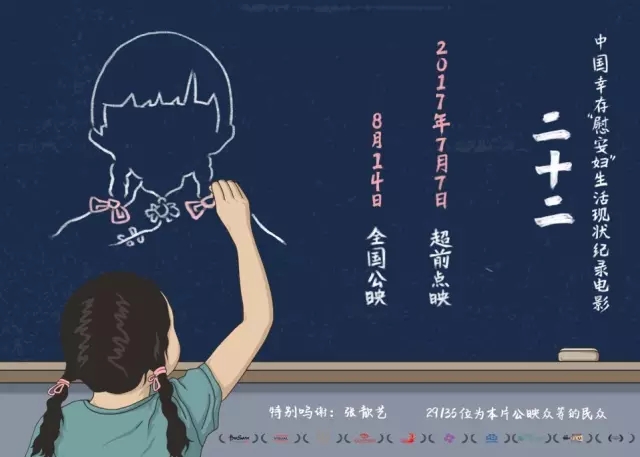
《二十二》是中国“慰安妇”题材纪录片第一次在院线展映,片子是3万多人众筹拍的,前期也没有做更多的宣传。
但是,上映8天,这部纪录片的排片率从1%提升到了10%,票房也破了1亿大关,这是大家都没有想到的。
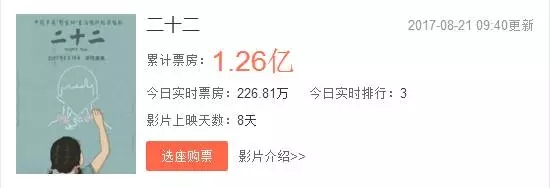
Su Beiqi, the head of the film's promotional team, said they expected the low-budget documentary, Twenty Two, which was shown on just 1 percent of China's 45,000 screens on its opening day Monday, which was international "comfort women" day, to have fewer screens as time passed.
电影宣传团队负责人苏北淇表示,这部低成本的纪录片《二十二》,在首映日也就是8月14日世界“慰安妇”纪念日,仅拿到中国4.5万块屏幕中1%的排片率,他们觉得随着时间推移排片只会越来越少。
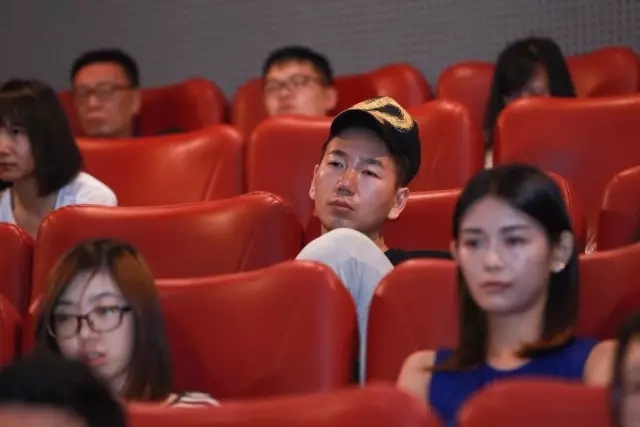
But the unexpected enthusiasm shown by viewers has changed the plans.
但是,观众们出乎意料的热情改变了整个计划。
很多人成了“自来水”,主动向身边人推荐《二十二》,明星们也主动在微博上帮助宣传,越来越多的人走进了电影院。
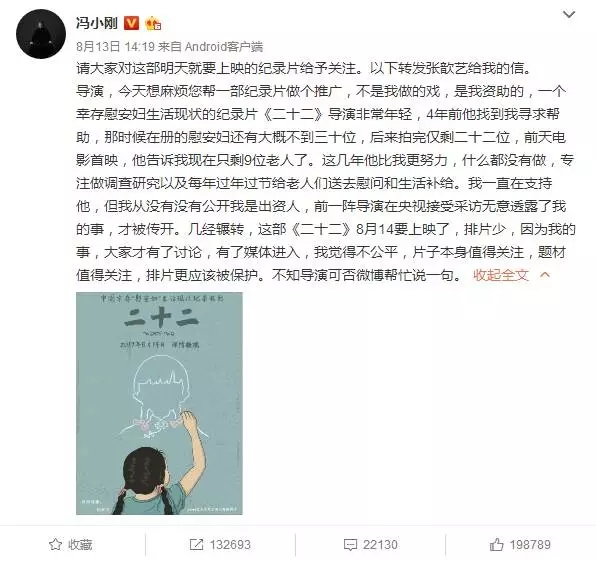
在8月20日的答谢会上,导演郭柯表示,票房收入会全部用来帮助这些幸存者。
“票房的这些收益,当然肯定要回到老人身上,接下来请大家给我一点时间,因为确实措手不及,这也对我是一个新的领域,我还要去摸索。”
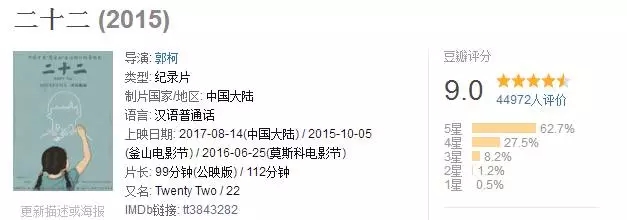
这部纪录片在豆瓣上表现不俗,拿下了9.0的高分。
More than 44,000 netizens commented on the film on Douban.com, where it has earned 9.0 points out of 10.
超过4.4万网友在豆瓣上给出了评价,影片获得9分的评分。
在国外影评网站IMDb上,也取得了8.5的评分。
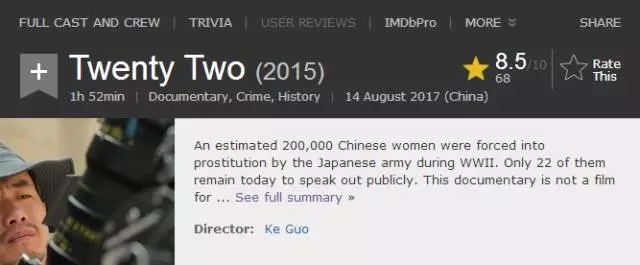
整部影片很安静,老人们过着普普通通的生活。
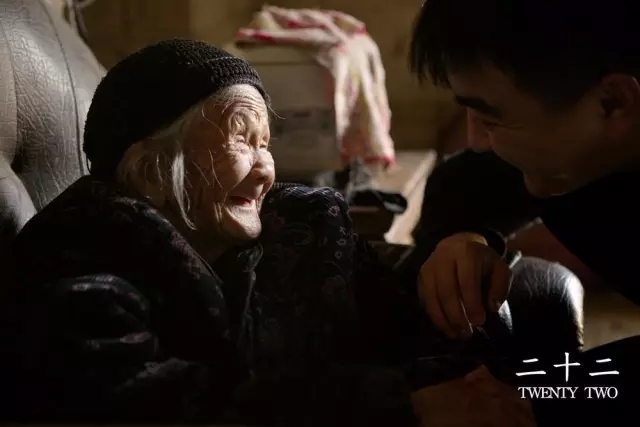
说起曾遭到日本人非人的待遇,她们悲痛,却又十分隐忍,不知道内心要多强大,才能勇敢活下来,说出来。
为什么要拍这部片子呢?导演郭柯如是说:
"I made Twenty Two because I wanted to see who they are," said Guo.
“我拍《二十二》,是因为我想知道她们是谁。”
"When Japan invaded China, some 200,000 Chinese women fell victim to the Japanese army's sex slavery."
“当年日本入侵中国,20多万中国妇女被迫沦为日军的性奴隶。”
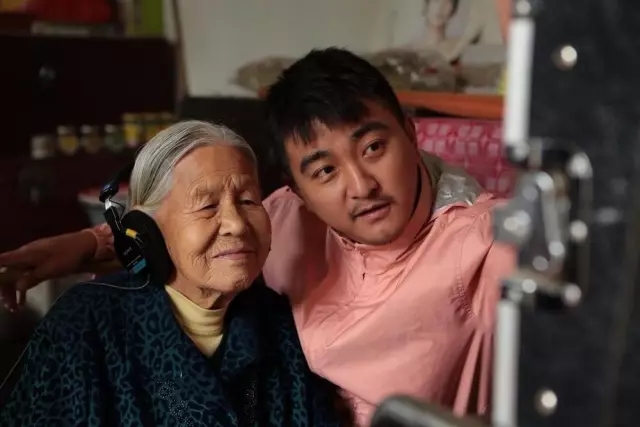
"Those elderly women survived unimaginable sufferings. But where are they now? What kind of life do they live? Are they happy or sad? What do they think about?"
“这些老人从无法想象的苦难中活了下来。但是她们现在在哪呢?她们又过着怎样的生活?她们是开心还是难过呢?她们在想些什么?”
影片的内容很克制。郭柯说,自己不会去强迫她们说什么,留着她们的沉默,让观众过去感受。
"I never pressed them because some were really reluctant to talk about it. When confronted with questions, they pondered over them. In five seconds, they kept silent, but from their eyes, audiences can find the answer they want to know," said Guo.
“有些老人实在不愿谈起,我从不会去强迫。面对一些问题,她们会陷入深思。5秒钟,她们都沉默着,但从她们的眼睛中,观众能找到想要的答案。”
他没有使用过多的电影手法,也没有加入太多史实,只希望能看到这些老人最真实的一面。
"What I want is to show the real part of the elderly, so I tried not to use montage and historical facts. We cannot make sure that historical facts could reflect their real experiences."
“我想展现的是老人们真实的部分,所以我尝试没用蒙太奇手法和史实影像。我们不确定,那些史实,是否能反映她们的真实遭遇。”
为了把对老人们的伤害最小化,他们充分尊重老人的意愿,不想说就不说,不想拍就不拍。
他们把机器、设备都安排在离老人们比较远的地方,中午老人午休他们就不拍了。
导演说,老人们会热情招呼他们,会关心他们。
“会把家里的东西给我们吃,会担心我们那么多小伙子中午有没有好好休息。就像老年人看着晚辈一样,她也很爱护你。”
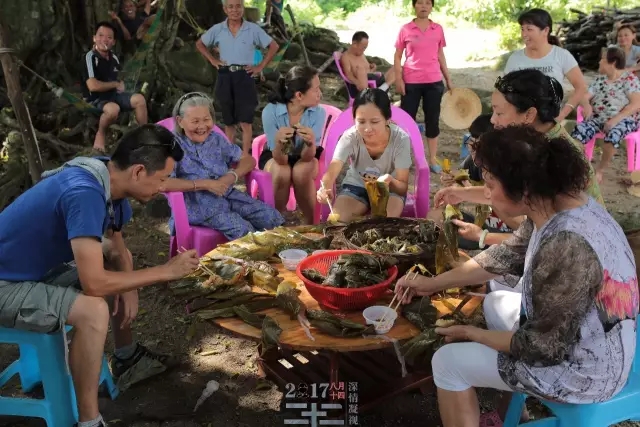
李美金老人请大家吃粽子
时间在静静流逝,老人们在慢慢老去、离去。
据中国“慰安妇”问题研究专家苏智良教授介绍,20多年来他们找到200多位幸存者,如今只剩下14位。而《二十二》中拍摄的22个人,如今只剩下8位。
就在本片公映的前两天,8月12日,中国大陆最后一位起诉日本政府的“慰安妇”幸存者黄有良在海南省陵水黎族自治县英州镇乙堆村的家中离世,终年90岁。
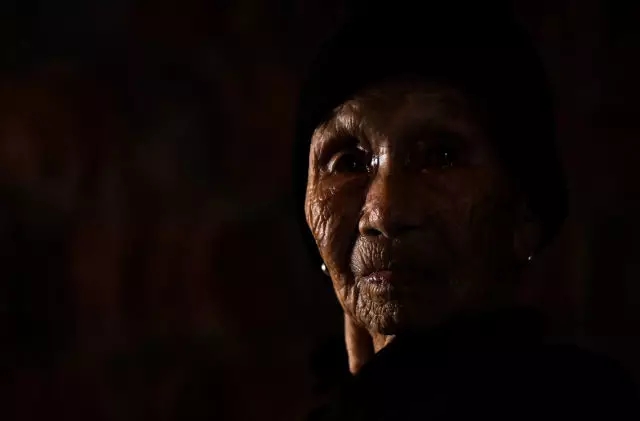
黄有良老人 资料图(8月2日摄 新华)
郭柯曾说,“这些老人相继在离世,来不及了。”
"The current life of the elderly will be history in the future. To respect this fact is to respect history. Years later, the film itself will be history."
“老人们的现状,未来将成为历史。尊重眼前的事实,就是尊重历史。多年后,这部电影本身也会成为历史。”
这部电影触动了很多人的内心,豆瓣短评中,大多数网友表达了观影过程中的感动。
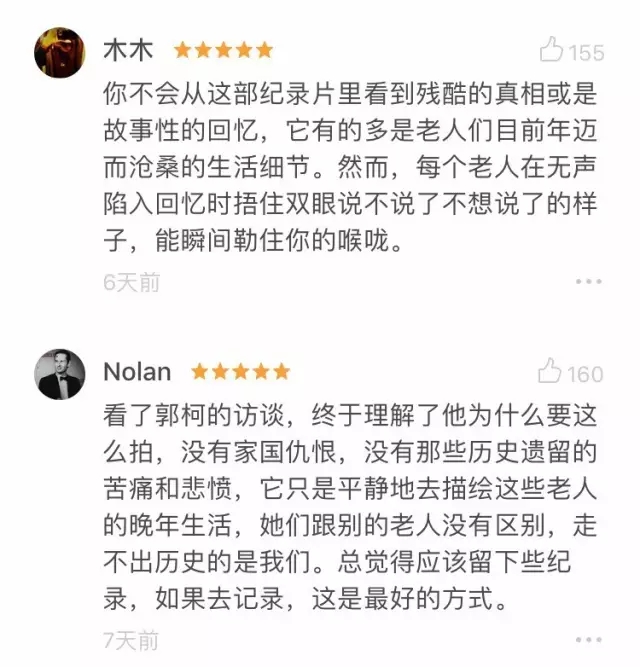
但也有网友不太认可电影的拍摄手法。
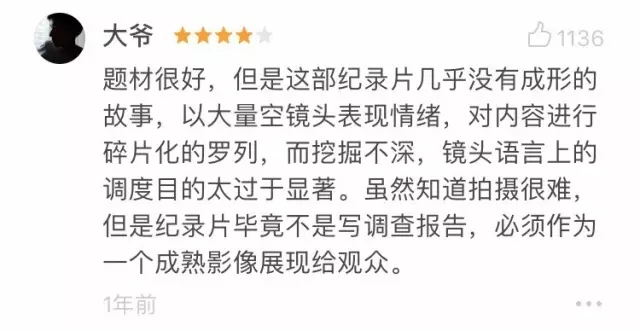
但更多人认为这部电影承载的意义已经大于电影本身。


还有外国人对这部电影感触很深。“歪果仁研究协会”的以色列小伙子高佑思,看完电影后百感交集,他愤怒于犯下罪行的人为什么不道歉……
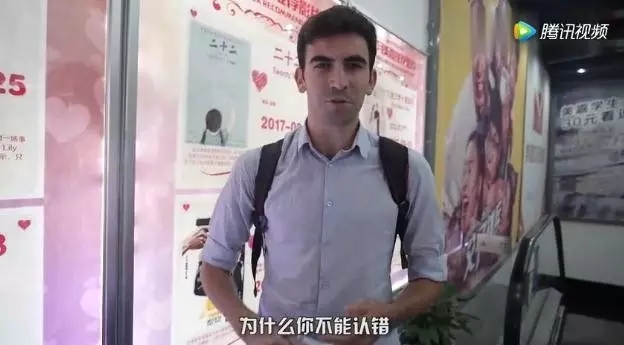
为什么人类会做出这样恶心的事情……
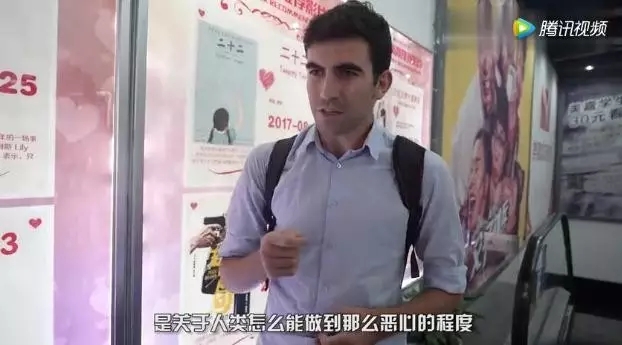
高佑思是犹太人,她的太奶奶经历过惨无人道的犹太人大屠杀(the Holocaust),在集中营生活了5年,曾亲眼看着自己的男朋友被纳粹打死。
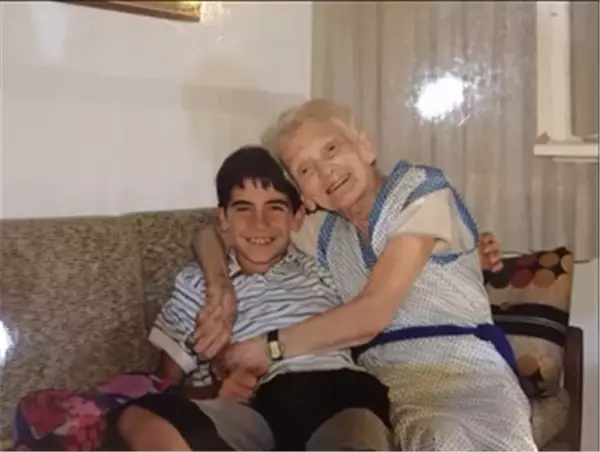
高佑思和太奶奶
他因此非常理解电影中老奶奶们埋藏在心里的痛苦……
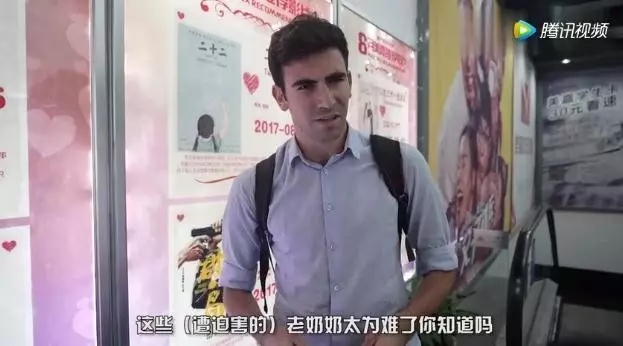
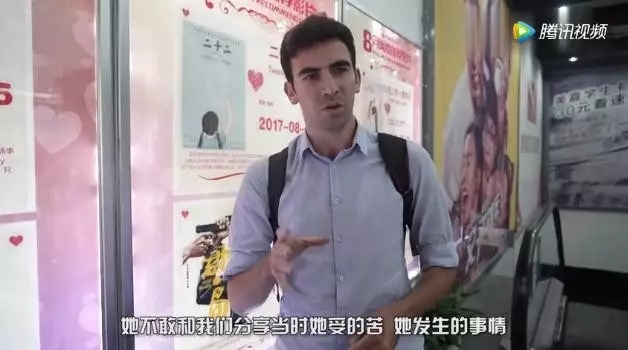
他说那一辈人经历的事情必须要记录下来,不能让历史消失,那将是人类的损失。
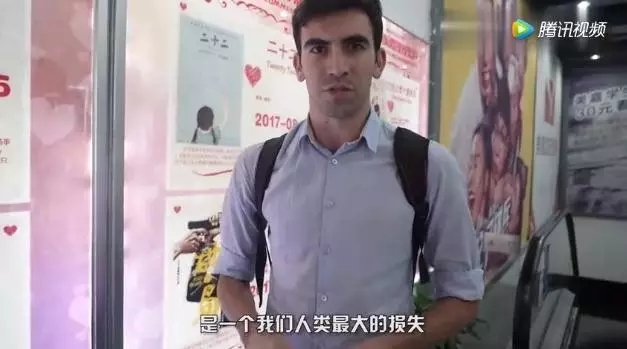
而不认错不反思历史,则是对下一代人的欺骗。
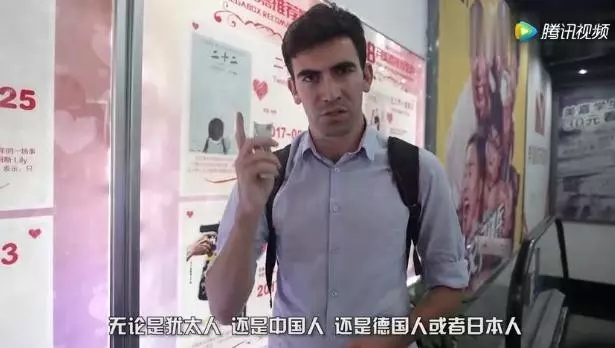
他引用犹太人的一句名言说:
Indifference is worse than death.
冷漠比死亡更可怕。
Indifference is worse than hate.
冷漠比仇恨更可怕。
Indifference is the reason for all evil in our humanity.
冷漠是人类所有恶念的来源。
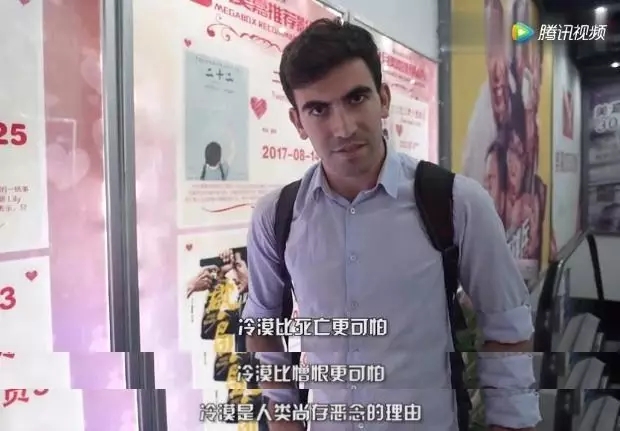
老人也许不愿说,但是我们不能忘。
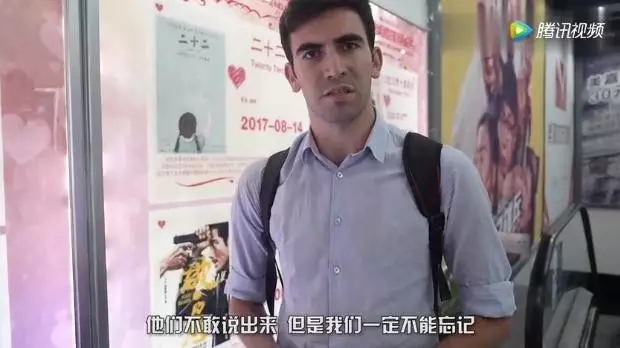
《二十二》在2015年韩国釜山国际电影节(Busan International Film Festival)入围“最佳纪录片”竞赛单元的时候,曾引发外媒的广泛关注。
釜山国际电影节曾为这部电影写下这样的评语:
As though not wishing to trespass on their lives, the camera approaches them slowly and tightly controlled, silently listening and watching. Crystal clear memories and memories long since forgotten; stories that want to be told, and at the same time be kept silent. That gap says more than words ever could. The pieces of the 22 women fit together to create a great work of history.
仿佛不愿侵扰她们的生活,镜头缓缓地向她们推近,极其克制,只是安静地倾听、默默地注视。是历历在目的清晰回忆,还是早已模糊不清的记忆,想要诉说的故事,又沉默地埋藏于心。这是用22个女人的人生拼凑起的一幅伟大历史画布。
专注亚洲电影的easternkicks.com网站的一篇影评说:
The film is a slow and somber affair, shot in a detailed widescreen. It captures every wrinkle of the survivors faces, and takes in much detail about the rural and often poverty stricken locations in which they reside. There are no talking heads from experts, there is no overarching commentary from the film-makers (other than the occasional on-screen text explaining some context). Quite often the subjects themselves are unable to really talk, so we just get glimpses into their lives.
这是一部缓慢而肃穆的电影,用宽荧幕呈现出大量细节。画面上,这些幸存老人脸上的皱纹被清晰地捕捉下来,她们在农村的贫困居所也被细腻地展现出来。没有滔滔不绝的专家出镜,也没有支配一切的评论旁白,只有一些介绍背景的字幕。但大多数时候,这些主人公都不太能说,所以我们只能看一看她们现在的生活。
这位影评人从电影镜头中读到了尊重:
Chinese culture is very concerned with the respect and care for the elderly, and you get the sense this is a film of utmost respect for these women. So when a few break down and cry on screen, and simply refuse to talk about what they have gone through, it becomes even more heartbreaking.
中国文化尤其敬重和关爱老人,你能感受到这部电影是带着极大的尊重去拍摄这些女人的。所以当其中几位老人在镜头前崩溃哭泣、不愿再讲下去时,那种心痛的感觉尤其强烈。
影评特别提到影片中帮助她们的人们:
We also get to meet people who want to help them, ordinary folk like retired teachers, farmers, and a young Japanese girl who has travelled to help out. What is striking is that these people just want to help them as people, at no point as a real political axe bought out for grinding.
我们还见到了很多愿意帮助她们的人,有普通退休教师、农民,也有日本的年轻女孩,千里迢迢来到中国伸出援手。最震撼人心的是,这些人只是单纯地帮她们,而不是把她们当做政治工具来使用。
评论也认为这部电影虽然有瑕疵,但其意义非常重大。
Twenty Two is far more a document of these women and their current lives than a documentary.
《二十二》与其说是一部纪录片,不如说是对这些女人和她们目前生存状态的记录。
To be harsh, as a film and as a documentary feature, Twenty Two has to many issues. But as a record of a dark time in recent history and of life as an elderly person in modern day China, it is an important and worthy piece of work.
苛刻一点说,作为一部电影和纪录片,《二十二》有很多问题。但它记录了近代史中最黑暗的岁月和那些老人在当代中国的生活,从这方面来讲,它是一部有分量和有价值的作品。
双语君(微信ID:Chinadaily_Mobile)看完这部电影,感触最深的却是奶奶们的顽强与坚韧。
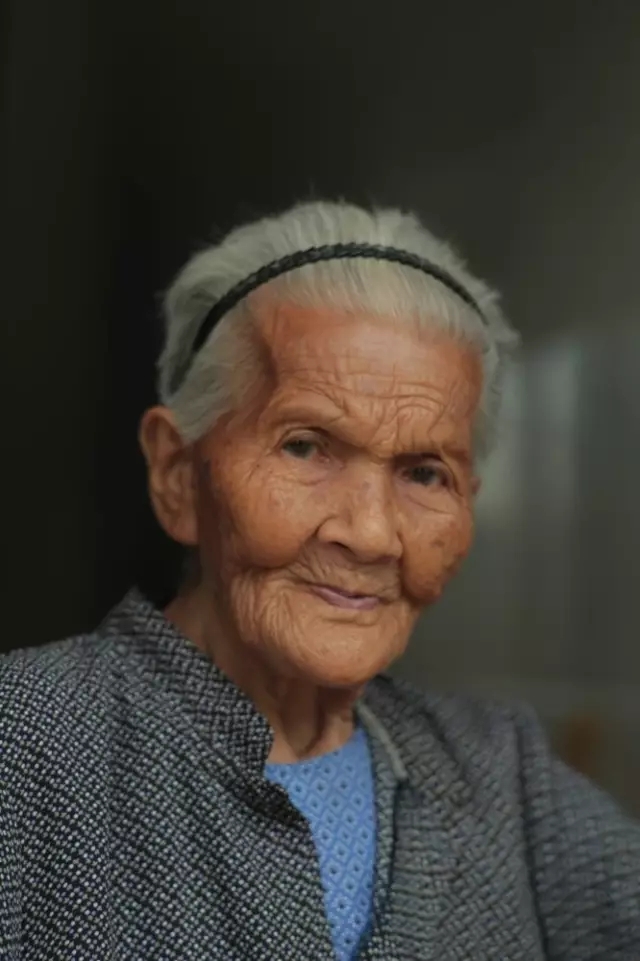
年逾耄耋,眼神中仍然透着倔强和刚毅的林爱兰老人。
我们在影片中,看着老人们做饭、吃饭、洗衣、喂猫、和后辈一起看《西游记》……
她们被战争伤害得千疮百孔,却仍然顽强乐观地活下来,心中想的不是仇恨,却是和平。她们仍以最大的善意对待这个世界。
片尾字幕中放出老人们说的几句话,让人瞬间泪目。
“这世界真好,吃野东西都要留着这条命来看。”
The world is so good. Sustain your life to be witness to it, even if that means eating only wild vegetables.
——韦绍兰(广西幸存老人)
“希望中国和日本要一直友好,不要再打仗。因为一旦打仗,就会有许多人死去的。”
I hope China and Japan can make peace with each other. No more wars. Once the war began, a lot of people would die.
—— 陈林桃(山西幸存老人)
“你们来看阿婆,阿婆就开心啊。”
I'm happy that you came to visit me.
——李美金(海南幸存老人)
好想抱抱这些老人。
愿人类记住历史,永远不要再犯过去的错误。
(来源:中国日报双语新闻编辑部)
